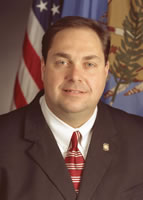In order to provide equal access and equal opportunity to people with diverse abilities, this site has been designed with accessibility in mind. Click here to view
Senator Gumm: Autism Rider “No Solution”; Both Sides Must Agree on Actuary
 Sen. Jay Paul Gumm
Sen. Jay Paul Gumm
Supporters of a proposal that would require health insurance policies to cover autism diagnosis and treatment say a proposal being suggested to families is no solution at all.
“Suggestions by some House Republicans that an insurance ‘rider’ for autism could be a solution is nothing but a lame effort to reduce political pressure,” said Senator Jay Paul Gumm. “It is no solution at all, and could make the situation worse.”
Gumm, D-Durant, said this proposed insurance rider would not provide adequate coverage and is limited to only those citizens using a provider offering it. Further, it only applies to families who can afford to purchase such a rider. In other states, such riders have included escalating costs, high deductibles and exclusionary clauses.
“All an autism rider would do is cleanse the risk pool of what insurance companies call ‘less desirable risks’,” Gumm said. “It essentially is a ‘self-insurance’ scheme that does not help families with autistic children at all. It is a feeble attempt to look good rather than do good.”
Timing is everything, the lawmaker noted, and the timing of these suggestions about an autism rider looks like a smokescreen.
“Time is of the essence in treating autistic children,” he said. “Every second we get closer to the end of this legislative session, and every day we lose more precious Oklahoma children to a disorder that is treatable. Nick’s Law would change that, if only we could get a hearing.”
Speaker Benge and Republican House leaders have denied the proposal – which has passed the Senate on four separate occasions – a chance even to be heard. The Speaker says an actuarial study must be done before the 2009 session of the Legislature beginning next February in order to determine the “true costs” of an autism insurance requirement.
“Even though we have provided an independent cost analysis written by a national expert, the Speaker and his inner circle have denied these families any help,” said Gumm. “I think any study commissioned by individuals who have stopped at nothing to continue insurance discrimination against autistic children would be extraordinarily suspect.
“For any study to be considered ‘independent,’ as the Speaker has asserted, we who support ‘Nick’s Law’ must agree on the actuary chosen. For the Speaker to do anything less will smack of a smokescreen designed to perpetuate House leaders’ regrettable opposition to ending the discrimination against autistic children.”
Gumm said there is still time for House leaders to do the right thing and allow a vote on the autism insurance bill.
“Florida’s Republican Legislature passed, and its Republican governor signed this week, an autism insurance bill,” he related. “This should not be a partisan issue, and it hasn’t been in other states. We know there are supporters on both sides of the aisle here in Oklahoma. They deserve vote on this bill; more importantly, the families deserve a vote.”
If that vote is denied, Gumm said he hopes House leaders will be more fair in gathering the information they say they need than they have been about allowing the people’s voice to be heard.
 Oklahoma Senate
Oklahoma Senate

